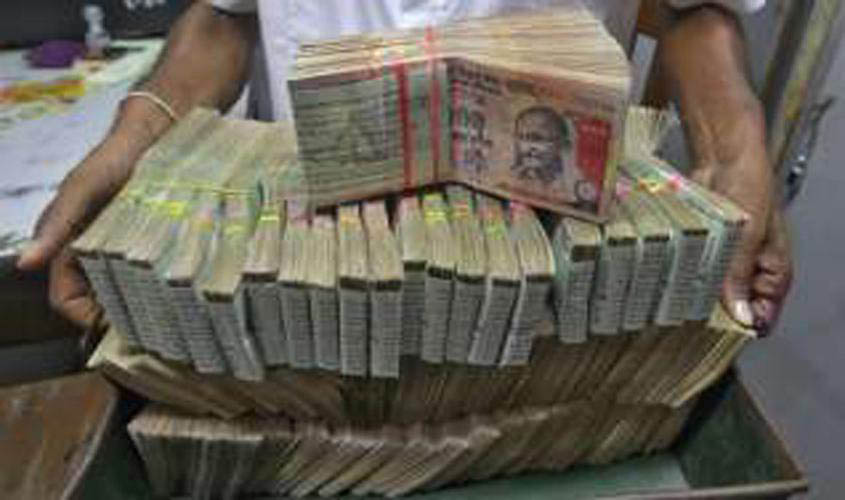 Demonetisation has emerged as a bad word in a large section of public discourse. It was criticised at the very outset eight months back; criticism has reached a crescendo in the past week. The Reserve Bank figures of demonetised currency back in its chest, coupled with the spectacular fall in the GDP rate, which in effect can rob India of the epithet “fastest growing economy”, has put a question mark on the decision with which Prime Minister Narendra Modi bewildered the nation on 8 November.
Demonetisation has emerged as a bad word in a large section of public discourse. It was criticised at the very outset eight months back; criticism has reached a crescendo in the past week. The Reserve Bank figures of demonetised currency back in its chest, coupled with the spectacular fall in the GDP rate, which in effect can rob India of the epithet “fastest growing economy”, has put a question mark on the decision with which Prime Minister Narendra Modi bewildered the nation on 8 November.
In political terms, the decision has yielded dividend. The Uttar Pradesh landslide was an indicator. The fact that Janata Dal(U) of Nitish Kumar, NCP of Sharad Pawar, YSR Congress, AIADMK factions and Biju Janata Dal have shown a political behaviour skewed in favour of the ruling BJP in recent months suggests that the Modi dispensation has made gains in the political spectrum as well. The NDA candidates polled above their assured votes in the recent President and Vice President elections—an indicator that elected representatives outside the NDA too have shown faith in the government.
The charge against demonetisation was most vociferously orchestrated by Mamata Banerjee last year. Opposition could not unite on this score. The scatter in the Opposition was visible when Lalu Yadav tried to bring anti-BJP parties together on one platform in Patna last week. The CPM stayed away (it did not want to share dais with Mamata) and so did Mayawati, perhaps because Akhilesh Yadav was there. Congress “high command”—Sonia Gandhi and Rahul—preferred to field the middle leadership.
On the political plane, the common man feels that the fight against black money has been taken up seriously. And that is a singular achievement.
Drop in GDP growth is a matter for concern. Is demonetisation the cause? Or is the unwillingness of India’s private sector to invest a reason? Subsidies to the poor are objected to by the captains of India’s industry, who prefer to lobby for “incentives” and tax breaks as inducement for investment. In recent days, Nehruvian economics and the “commanding heights” it assigned to the public sector have been subject to not only criticism, but ridicule. The inability of the private sector to participate in the growth story today is poor commentary on India’s industry. The government is relying on the private sector to drive growth. But that is elusive. In the Eighth Plan, a commanding role was envisaged for the private sector in power generation. In the two decades that have elapsed, private players came in as distributors, but not as major producers or played a role in transmission. In a modern economy, private sector role is prime. Unfortunately, in India, it is not the case so far.
government to involve private players in the expansion of metro rail network was greeted with caution by E. Sreedharan, the man who gave Delhi its metro and was the pivot of the historic Konkan railway project. He was not being unfair—the experience in Delhi, where a leading business house cried off after initial enthusiasm, was perhaps lurking in his mind. (Incidentally, this private player is now being entrusted major defence production initiatives.) Private investment growth and job creation, both in private and public sectors should be accorded priority. This is not happening.
While lack of private investment, in spite of lowering of interest rates, is a cause for falling GDP growth, we read stories in the business press about the investments being made by Indian entrepreneurs abroad. Many captains of industry are building nests elsewhere. In Indian conditions, perhaps the role of the state in triggering growth cannot be underplayed.
Narendra Modi had come to power with the promise of curbing black money. His proclamation that Rs 15 lakh will come into everyone’s account from the largesse stashed in Swiss banks has proven to be an election hype. However, it cannot be denied that there has been a curb in illegal transactions. There has been a growth in the number of bank accounts. Transactions are being legitimised. The slump in real estate following Modi assuming power is proof that the message against wrongdoing has gone down well. The fact that post demonetisation 18 lakh bank accounts with doubtful transactions are under income tax scrutiny, is heartening. The drive against benami properties has been taken up in right earnest and notices have been sent out. Above all, the introduction of Goods and Services Tax has ensured that the “kuchcha bill” has become a thing of yore. All transactions from the manufacturing point to the distribution shelves are traceable: this, apart from ensuring revenue, also provide indicators of income earned.
Consumer price index has dipped from plus four per cent levels to less than two per cent in recent months. Lower interest rates (lower EMIs) and lower inflation are being used to provide affordable housing—the effect of this will only be visible in the long term. In the short term, the very fact that speculation in real estate has slumped and people by and large are wary of dubious transactions is good news for a clean economy.
On the political plane, the common man feels that the fight against black money has been taken up seriously. And that is a singular achievement, in spite of the many flaws which were noticed in the implementation of the mammoth exercise.

